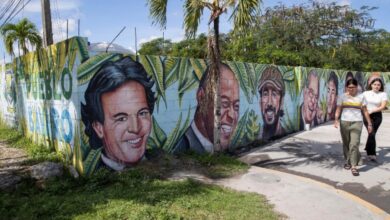Urgent Call for Regional Unity Against Organized Crime in Latin America

Amid a surge in organized crime, Latin America faces a pivotal moment. Former Ecuadorian Minister María Fernanda Espinosa champions a unified regional response, transcending borders and ideologies, to safeguard the continent’s future.
Organized crime has long cast a shadow over Latin America’s rich cultural and natural tapestry, but recent developments have pushed this issue to the forefront of regional concerns. María Fernanda Espinosa, Ecuador’s former Minister of Foreign Affairs and Defense, has issued a clarion call for a coordinated regional approach to combat this burgeoning threat. Her insights, shared during an interview at the UN Civil Society Conference in Nairobi, underscore the urgency of this collective action.
Tackling Organized Crime in Latin America
Latin America, with its vibrant cities and expansive rural areas, has become a battleground where the forces of organized crime wreak havoc, challenging the very fabric of societies. From Mexico’s drug cartels to the violent gangs of El Salvador, the tentacles of organized crime spread far and wide, leaving a trail of violence and corruption. In Ecuador alone, the homicide rate has alarmingly increased to 45 per 100,000 inhabitants in 2023, placing it among the highest in the region.
Espinosa’s call for unity is a plea and a strategic imperative. The interconnected nature of these criminal networks, which traffic not only in drugs but also in arms and humans, particularly impacting women and girls, necessitates a response that transcends national boundaries. These are not isolated problems of individual nations but a complex web of challenges that affect the entire continent.
Moreover, the rise of multinational activities and porous border controls have only facilitated the expansion of these networks, making traditional law enforcement methods insufficient. The globalization of crime, where supply chains of illicit goods stretch across continents, demands a similarly globalized approach in response. This is where Espinosa’s vision for a coordinated effort becomes critically relevant.
However, the challenge extends beyond simply ramping up policing and border security. It involves addressing the root causes of crime, such as poverty, inequality, and lack of opportunity, which are prevalent across many Latin American countries. These socio-economic issues provide fertile ground for criminal organizations to recruit and thrive. Thus, a holistic approach that combines security measures with social policies is essential.
Navigating Political Hurdles and Ideological Divides
The political landscape of Latin America, often characterized by ideological divides and transient alliances, poses another hurdle to Espinosa’s proposal. Yet, the urgency of the threat posed by organized crime calls for leaders to rise above political differences and ideological entrenchments. As Espinosa pointedly highlights, few women hold presidential roles in the region, but the leadership shown by figures like Honduras’s President Xiomara Castro can serve as a beacon for collaborative efforts.
Recent diplomatic tensions, such as those between Ecuador and Mexico over the arrest of former Vice President Jorge Glas, underscore the need for diplomacy and dialogue, as Espinosa suggests. These incidents reveal how quickly international relations can be strained by internal security issues, further complicating the regional response to organized crime.
A unified strategy against organized crime in Latin America should include enhanced intelligence sharing, joint operations, and harmonized legal frameworks to prosecute transnational crime effectively. Building more muscular judicial systems and improving public trust in law enforcement are crucial for sustainable success.
Community involvement is also pivotal. Initiatives that engage local communities in crime prevention and provide education and economic opportunities can reduce the allure of criminal networks. The region can weaken the grip of organized crime by empowering people, especially the youth, to choose alternative livelihoods.
María Fernanda Espinosa’s call is a beacon of hope in turmoil. It is a reminder that the fate of Latin America is interconnected, and only through a shared commitment to peace and security can the region hope to overcome its challenges. The task ahead is daunting, but the message is clear: unity and cooperation are beneficial and necessary for survival.
International Support and the Global Imperative
As Latin America stands at this crossroads, the global community must also lend its support. International aid, strategic partnerships, and compliance with international law are essential to bolster regional efforts. The battle against organized crime in Latin America is a regional concern and a global imperative.
Also read: Green Economy: How Latin America Could Thrive on Cannabis Legalization
The time to act is now. As Espinosa urges, setting aside differences and coming together is the only path forward. For Latin America, a region rich with potential and beleaguered by challenges, the promise of a safer, more just future is within reach, provided its leaders and people unite toward this common goal.





